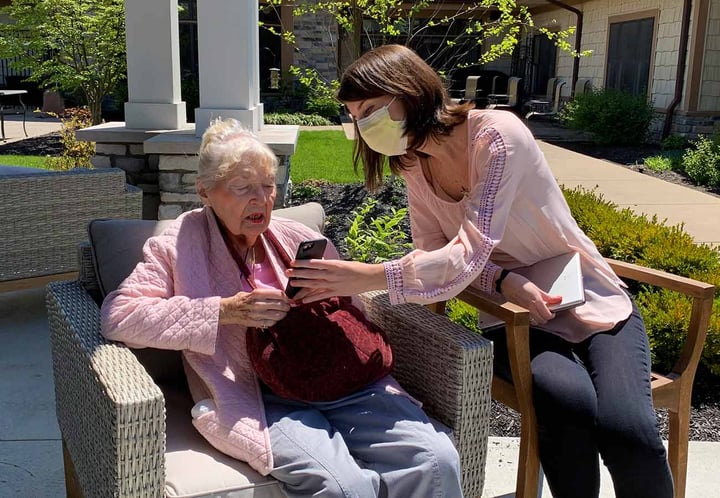
What do impromptu acting performances have to do with providing care for a senior who is living with dementia? Well, just about everything.
At its core, the idea behind improvisational acting is that you build on whatever the other person has said. You don’t question them or try to correct them. One of the key phrases in improv is “yes, and…” In doing so, you affirm what the other person has said, and then you share something yourself or ask them a question.
While it might sound unusual, using improv techniques can help caregivers engage in conversations with seniors with Alzheimer’s and dementia. Those with advanced memory loss often begin sharing stories that may or may not have ever happened. Instead of correcting them or asking if they’re sure, that’s true. Turning to improv training can create a stronger connection.
How Improv Training Helps Seniors
When caregivers have minimal improv training, they’re more equipped to foster positive conversations and relationships with those who need memory support. Actual improv has many different facets, but the most important for this scenario is the “yes, and” idea. Seniors with dementia often hear the word “no” or hear some other phrase that implies it. Hearing a “yes” occasionally can improve their self-esteem and help them feel like they have some control.
Improv training also helps caregivers to enter into their loved one’s world. This is where the individual is most comfortable and often where they’re happiest. It can be a gut instinct for us to correct our loved ones and remind them of the realities of our world, but in many cases, that does more harm than good. Such a response can disorient a person with dementia and upset them.
Instead, by affirming your loved one’s statements and asking them questions, they can continue to enjoy the world they’ve created for themselves where they’re comfortable. At first, it might feel strange to agree with a statement that isn’t true. However, when you do, you’re able to more fully enjoy your time and conversations with them without causing them undue distress.
Here’s a scenario many caregivers encounter. Imagine your aging parent or spouse gets up in the morning, gets dressed, and then starts looking for their car to go to work. Instead of reminding them that they have been retired for many years, you might instead say, “Oh, your boss called earlier and said there’s no work today.”
“Improv reshapes how you’re viewing the entire interaction,” Shannon Braun, the Director of Episcopal Retirement Services’ Center for Memory Support & Inclusion, explained in a recent interview. “Now, it doesn't matter whose version of the story is accurate. It becomes a way that you can interact with this person. You can have meaningful engagement. And it's something that people do all the time anyway.”
 Pictured: Director of ERS's Center for Memory Support & Inclusion, Shannon Braun, with a resident.
Pictured: Director of ERS's Center for Memory Support & Inclusion, Shannon Braun, with a resident.
“Some people have a hard time with that,” Shannon continues. “Wherever you land on that spectrum of comfort, the improv strategy allows people the opportunity to enter their loved one’s reality. Plus, the more you do it, the more comfortable you get and the easier it becomes.”
Memory Care at Marjorie P. Lee
Taking some improv training or simply picking up the “yes and” technique can help all caregivers. Still, for some seniors with dementia and Alzheimer’s, living at home becomes an impractical choice, and a memory care community is the better, safer decision.
At Marjorie P. Lee, we have a dedicated memory care neighborhood with highly trained staff who will care for your aging loved one the way you would. Our memory support services are not only innovative but also person-centered. We use cognitive therapies like the SAIDO learning technique, where caregivers meet with seniors to build relationships and engage in specific mental tasks.
We offer and prioritize many other memory care services for our residents, like the music and memory program that gives seniors personalized playlists to help them reach deep memories. The It’s Never 2 Late technology is designed to holistically enhance the health of seniors with dementia or Alzheimer’s. Consider a range of caregiving techniques, including art therapy, physical therapy, music, and yoga. Seniors in our memory care community have access to all of these programs.
We’ve incorporated improv training and the “yes, and” technique into conversations and life with our memory care residents. Improv principles also include listening fully and intently, being specific, sharing in the silence, and being in the moment. When you can take these skills and practice them with your loved one, you can improve their quality of life and have a more positive connection with them.












